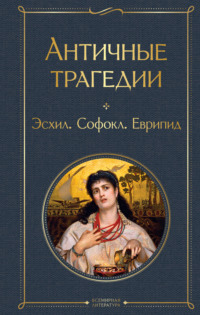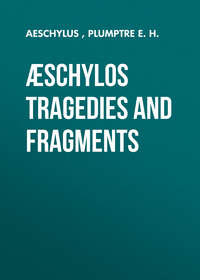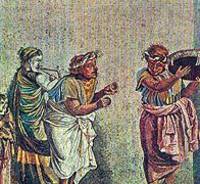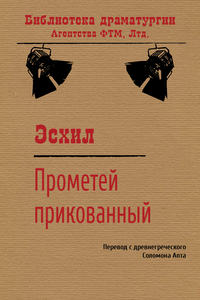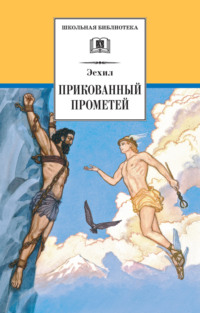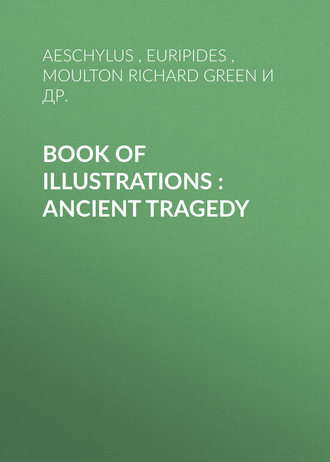 полная версия
полная версияBook of illustrations : Ancient Tragedy
Sepulchral Paean of short Strophe and Antistrophe: for these libations' sake may the curse be averted – yet who strong enough to come as Averter: while Electra is pouring the libations on the tomb. {157}
Electra returns to Stage, her whole manner changed: as if the prayer had already begun to be fulfilled, she has found the mysterious locks which, she bit by bit lets out, must be those of Orestes – the Chorus, like sailors in a storm, can only invoke the gods: if the day has come, from a small seed a mighty trunk may grow – Electra then discovers foot-prints [as if leading from the Side Stage-door to the Orchestra-staircase] of two travellers; one foot-print agrees with her brother's: {203}
Orestes and Pylades come forward: recognition and joy, Electra hardly believing. She addresses him by four-fold name: as father dear,
The love I owe my mother turns to thee, My sister's too that ruthlessly was slain, And thou wast ever faithful brother found.Orestes compares his family to an eagle's brood orphaned by the spoiler. Electra catching at the omen of eagle, dear bird of Zeus who will avenge his own —Chorus are afraid that their noisy joy may be overheard and ruin all – Orestes has no fear of ruin after the strong oracles of Apollo that bade him come under terrible penalties if he disobeyed: {261}
Leprous sores that creep All o'er the flesh, and as with cruel jaws Eat out its ancient nature, and white hairs On that foul ill to supervene: and still He spake of other onsets of the Erinnyes, As brought to issue from a father's blood; For the dark weapon of the Gods below Winged by our kindred that lie low in death, And beg for vengeance, yea, and madness too, And vague, dim fears at night disturb and haunt me, Seeing full clearly, though I move my brow In the thick darkness.. and that then my frame Thus tortured should be driven from the city With brass-knobbed scourge: and that for such as I It was not given to share the wine-cup's taste, Nor votive stream in pure libation poured; And that my father's wrath invisible Would drive me from all altars, and that none Should take me in or lodge with me: at last, That loathed of all and friendless I should die, A wretched mummy, all my strength consumed. Must I not trust such oracles as these? {297}The Chorus, breaking into lyrics, feel that Justice has at last taken their side: then follows an elaborate
KOMMOS, OR LYRIC CONCERTOby Orestes, Electra and Chorus, in highly intricate and interwoven Strophes and Antistrophes, with funereal gesture. The jaws of flame do not reduce the corpse to senselessness; they can hear below this our Rite and will send answer – what a fate was Agamemnon's, not that of the warrior who dies leaving high fame at home and laying strong and sure his children's paths in life, but to be struck down by his own kin! But there is a sense of Vengeance being at hand, Erinnys and the Curses of the slain; they make the heart quiver: the Dirge crescendoes till it breaks into the 'Arian rhythm,' a foreign funeral rhythm with violent gestures (proper to the Chorus as Asiatics); and so as a climax breaks up into two semi-choruses: one sings of woe, the other of vengeance, and then the formal Dirge terminates and the Blank Verse recommences. {469}
In a composed frame (and in Blank Verse) Orestes and Electra repeat the distinct prayer for Vengeance and the death of Aegisthus and then address themselves to the means. Orestes enquires as to the meaning of the Sepulchral rites, and the dream is narrated, which he interprets as good omen.
Orest. And have ye learnt the dream, to tell it right? {517}
Chor. As she doth say, she thought she bare a snake. Orest. How ends the tale, and what its outcome then? Chor. She nursed it, like a child, in swaddling clothes. Orest. What food did the young monster crave for then? Chor. She in her dream her bosom gave to it. Orest. How 'scaped her breast by that dread beast unhurt? Chor. Nay, with the milk it sucked out clots of blood. Orest. Ah, not in vain comes this dream from her lord. Chor. She, roused from sleep, cries out all terrified, And many torches that were quenched in gloom Blazed for our Mistress' sake within the house. Then these libations for the dead she sends, Hoping they'll prove good medicine of ills. Orest. Now to earth here, and my sire's tomb I pray, They leave not this strange vision unfulfilled. So I expound it that it all coheres; For if, the self-same spot that I left leaving, The snake was then wrapt in my swaddling clothes, And sucked the very breast that nourished me, And mixed the sweet milk with a clot of blood, And she in terror wailed the strange event, So must she, as that monster dread she nourished, Die cruel death: and I, thus serpentised, Am here to slay her, as this dream portends; I take thee as my dream-interpreter.They rapidly arrange their plan to appear as foreigners, and get admission to the Palace, or, if Aegisthus come out, strike him down at once – with a prayer to Apollo exeunt Electra, Orestes, and Pylades by the Distance Sidedoor. {575}
CHORAL INTERLUDE Iin four Strophes and Antistrophes.
Monsters and woes are many, but most terrible of all is a passion-driven woman: Thestias, who burnt out the mystic brand that measured her son's life; Scylla, who robbed her father of his life-charm; another – but the woman who slew her warrior-chief it is meet for me to pass over in silence. Then there is the great Lemnian Crime, foremost of all crimes; yet this might well be compared to it; and as that race perished, so is judgment at hand here; the anvil-block of Vengeance firm is set, and Fate is swordsmith hammering; in due time the debt of guilt is paid. {639}
EPISODE IIEnter by the Distance Side-door Orestes, Pylades, and attendants, and advance to the Central Door.
Orestes calls loudly for admission, telling the slave who opens that he is a traveller, and must do his message to those within ere night falls; to a lady if a lady rules, though a lord is seemlier. Enter Clytaemnestra, who gives a formal offer of hospitality (having noticed his irreverent tone), and to whom he bluffly gives a message from a fellow traveller, who learning he was bound for Argos, begged him to seek out Orestes' kinsmen and give the news of his death. Clytaemnestra affects a burst of grief; the curse has taken another victim as he was disentangling himself from the net. Orestes regrets he cannot hope for the welcome of those who bear good news. Clytaemnestra (with a dim feeling of suspicion) assures him he shall want for nothing 'that is fitting', orders Orestes to be led one way, and the rest another, and goes to call Aegisthus 'and friends.' Exeunt Clytaemnestra by Left Inferior Door to the Women's Quarters, Orestes and Porter through Central and Pylades, etc., through Right Inferior Door. Chorus, in marching rhythm, catch the touch of suspense, and invoke Hermes and the Spirit of Persuasion for Orestes. {720}
Enter from Women's Quarters, Cilissa, Orestes' Nurse, bidden to seek Aegisthus, as the stranger looks like one meaning to cook some ill. She is in tears at the death of her boy, and details all the petty cares she had over his helpless infancy, and how they are now all profitless.
Chor. And how equipped then doth she bid him come? {753}
Nurse How? Speak again that I may better learn. Chor. By spearmen followed, or himself alone? Nurse She bids him bring his guards with lances armed. Chor. Nay, say not that to him thy lord doth hate, But bid him 'come alone,' (that so he hear Without alarm), 'full speed, with joyous mind,' Since 'secret speech with messenger goes best.' Nurse And art thou of good cheer at this my tale? Chor. But what if Zeus will turn the tide of ill? Nurse How so? Orestes, our One hope is gone. Chor. Not yet; a sorry seer might know thus much. Nurse What say'st thou? Know'st thou aught besides my tale? Chor. Go tell thy message; do thine errand well: The Gods for what they care for, care enough. Nurse I then will go, complying with thy words: May all, by God's gift, end most happily! {769}Exit Nurse by Right Side-Door, signifying neighborhood.
CHORAL INTERLUDE IIin four interwoven Strophes and Antistrophes, with Mesode,
invokes the Gods the house had worshipped. Zeus, father of the Gods, the twin-brothers, Apollo in his glorious shrine at Delphi, Hermes who is the conductor of enterprises: the dear son of the house is harnessed to the car of calamity, moderate its pace – and may Murder cease to breed new Murder. But the Avenger, like Perseus, must not look on the deed as he does it; as she calls the name Mother let him hurl back the cry of Father. {820}
EPISODE IIIAegisthus entering from the Right Side-Door (of Neighborhood) speaks of this summons; it may after all be women's fears 'that leap up high and die away to nought.' The Chorus say there is nothing like asking. Aeg. will do so: they cannot cheat a man with his eyes open. Exit through Central Door. {839}
Chorus, in short lyric burst, mark critical moment that decides success or failure. {853}
Then cries from within, and Porter rushes from Central Door to Door of Women's Quarters (Left Inferior), loudly summoning Clytaemnestra, and when she appears informs her 'the dead are slaying the living.' She sees in a moment the truth, and is looking hurriedly for aid, when enter, from Central Door, Orestes, joined at once by Pylades and Attendants, from Right Inferior.
Orest. 'Tis thee I seek: he there has had enough. {878} Clytaem. Ah me! my loved Aegisthus! Art thou dead? Orest. Lov'st the man? Then in the self-same tomb Shalt thou now lie, nor in his death desert him. Clytaem. [baring her bosom] Hold, boy! Respect this breast of mine, my son, Whence thou full oft, asleep, with toothless gums, Hast sucked the milk that sweetly fed thy life. Orest. What shall I do, my Pylades? Shall I Through this respect forbear to slay my mother? Pyl. Where, then, are Loxias' other oracles, The Pythian counsels, and the fast-sworn vows? Have all men hostile rather than the gods. Orest. My judgment goes with thine; thou speakest well. [To Clytaemnestra.] Follow: I mean to slay thee where he lies, For while he lived thou held'st him far above My father. Sleep thou with him in thy death, Since thou lov'st him, and whom thou should'st love hatest. Clytaem. I reared thee, and would fain grow old with thee. Orest. What! Thou live with me, who did'st slay my father? Clytaem. Fate, O my son, must share the blame of that. Orest. This fatal doom, then, it is Fate that sends. Clytaem. Dost thou not fear a parent's curse, my son? Orest. Thou, though my mother, did'st to ill chance cast me. Clytaem. No outcast thou so sent to house allied. Orest. I was sold doubly, though of free sire born. Clytaem. Where is the price, then, that I got for thee? Orest. I shrink for shame from pressing that charge home. Clytaem. Nay, tell thy father's wantonness as well. Orest. Blame not the man that toils when thou'rt at ease. Clytaem. 'Tis hard, my son, for wives to miss their husband. Orest. The husband's toil keeps her that sits at home. Clytaem. Thou seem'st, my son, about to slay thy mother. Orest. It is not I that slay thee, but thyself. Clytaem. Take heed, beware a mother's vengeful hounds. Orest. How, slighting this, shall I escape my father's? Clytaem. I seem in life to wail as to a tomb. Orest. My father's fate ordains this doom for thee. Clytaem. Ah me! The snake is here I bare and nursed. Orest. An o'er-true prophet was that dread dream-born. Thou slewest one thou never should'st have slain, Now suffer fate should never have been thine. {916}
Exeunt Orestes and Pylades, forcing Clytaemnestra through the Central Door, their attendants remaining to guard the door. Chorus, after a word of pity for even this 'twain mischance,' break into
CHORAL INTERLUDE IIIin three interwoven Strophes and Antistrophes.
Late came vengeance on Troy, late now has it blest this heaven-sent exile, and our Master's house is freed. On a lover of the war of guile has Revenge come subtle-souled, Vengeance who
Is guileful without guile, Halting of foot and tarrying over-long; The will of Gods is strangely over-ruled, It may not help the vile.At last we see the light. All-working Time with cleansing rites will purify the house; Fortune's throws shall fall with gladsome cast: at last we see the light. {959}
EXODUS, OR FINALEEnter from Main Door Orestes and Pylades, their Attendants bearing the Corpses, and the net in which Agamemnon had been murdered.
Orestes solemnly declares that they have perished as murderers; they swore to live and die together and they have kept the oath. He bids the Attendants stretch out in full light of the Sun, the great Purifier, the fatal net, as pledge that he did his dread deed only as deed of necessary vengeance – he dwells on the cruel device – but Chorus seeing side by side the net and the slaughter by which it has been avenged, can think of nothing but the woe which its avenger by his deed of vengeance must bring on himself. Orestes reiterates the crime of which this deed is the reminder. The Chorus cannot help repeating the unhappy omen. {1009}
At this very moment Orestes changes and begins to feel the oncoming madness – while reason yet stays with him he repeats his innocence and puts on the suppliant's fillet, with which he will go to Delphi, and challenge the God who sent him on the errand to free him from its dire consequences. Madness increases, and he can see the Furies in bodily shape dark-robed, and all their long tresses entwined with serpents. In rapid dialogue the Chorus bid him cling to the idea of Apollo, and he bursts away through Distance-Door on Left to commence his long career of wanderings. The Chorus conclude:
Here, then, upon this palace of our kings A third storm blows again; The blast that haunts the race has run its course. First came the wretched meal of children's flesh; Next what befel our king: Slain in the bath was he who ruled our host, Of all the Achaeans lord; And now a third has come, we know not whence, To save.. or shall I say, To work a doom of death? Where will it end? Where will it cease at last, The mighty Atè dread, Lulled into slumber deep?THIRD PLAY: AFTERNOON:
THE GENTLE GODDESSES
EUMENIDES4
The Scene represents the Oracle of Delphi: the Central Doors being the Gate of the 'Adytum,' or Innermost shrine. From the left Inferior Door enter the Priestess of the Oracle, who stands in front of the Central Gate, to offer the Morning Prayer.
PROLOGUEThe Priestess's Prayer enumerates the Deities who have connection with the Ancient Oracle, how Apollo is its main guardian, after it has passed through many hands; other Deities have a share in it, even Zeus the Supreme Accomplisher. Praying that her divinations that day may excel even her past, she calls on the Pilgrims to come as the lot permits. {28}
Exit through the Main Gate into the Inner Shrine. In a moment she returns, pale and disordered, flinging open the Central Gates, through which can dimly be discerned dreadful forms in the Inner Shrine.
She can hardly stand for the terror of the sight she has seen; the sacred shrine polluted by the presence of a man in suppliant garb, bunch of olives and tufts of wool, his sword yet reeking with a recent murder; and sitting round about him yet more dreaded beings.
A troop {46} Of women strange to look at sleepeth there Before this wanderer, seated on their stools; Not women they, but Gorgons I must call them; Nor yet can I to Gorgon forms compare them; I have seen painted shapes that bear away The feast of Phineus. Wingless, though, are these, And swarth, and every way abominable. They snort with breath that none may dare approach, And from their eyes a loathsome humour pours, And such their garb as neither to the shrine Of Gods is meet to bring, nor mortal roof. Ne'er have I seen a race that owns this tribe, Nor is there land can boast it rears such brood, Unhurt and free from sorrow for its pains. Henceforth, be it the lot of Loxias, Our mighty lord, himself to deal with them: True prophet-healer he, and portent-seer, And for all others cleanser of their homes. {63}At her word, in the entrance of the Inner Shrine appears Apollo with Hermes, and they lead Orestes out.
Apollo will never fail his suppliant; it is he who has sent sleep on these loathly Beings, born out of evils, with whom neither Gods nor men hold intercourse. They will still pursue, but he must fly to the ancient City of Pallas and clasp her statue; there 'judges of these things' and 'a means' will be found to rid him of his evils. Orestes expresses confidence in Apollo's justice, who reiterates his pledge in the name of Zeus and commits the wanderer to the charge of his own brother Hermes, the Escort-God, to take him safe to Athens. {93}
Apollo disappears into his shrine, and Hermes and Orestes leave by the Left side or Distance-door. The stage being thus left vacant, the machinery of the roller-stage brings the interior of the cave to the front, showing the sleeping Furies scattered over the floor. The Ghost of Clytaemnestra rises in front of the entrance to the Inner Shrine.
Clytaem. What ho! Sleep on! What need of sleepers now?
And I am put by you to foul disgrace Among the other dead, nor fails reproach Among the shades that I a murderess am; And so in shame I wander, and I tell you That at their hands I bear worst forms of blame. And much as I have borne from nearest kin, {100} Yet not one god is stirred to wrath for me, Though done to death by matricidal hands. See ye these heart-wounds, whence and how they came? Yea, when it sleeps, the mind is bright with eyes; But in the day it is man's lot to lack All true discernment. Many a gift of mine Have ye lapped up, libations pure from wine, And soothing rites that shut out drunken mirth; And I dread banquets of the night would offer On altar-hearth, at hour no god might share. And lo! all this is trampled under foot. He is escaped, and flees, like fawn, away, And even from the midst of all your toils Has nimbly slipped, and draws wide mouth at you. Hear ye; for I have spoken for my life; Give heed, ye dark, earth-dwelling goddesses, I, Clytaemnestra's phantom, call on you. [The Erinnyes moan in their sleep.] Moan on, the man is gone, and flees far off; My kindred find protectors; I find none. [Moan as before.] Too sleep-oppressed art thou, nor pitiest me: Orestes, murderer of his mother, 'scapes. [Noises repeated.] Dost snort? Dost drowse? Wilt thou not rise and speed? What have ye ever done but work out ill? [Noises as before.] Yea, sleep and toil, supreme conspirators, Have withered up the dreaded dragon's strength.Chorus of Furies, starting up suddenly with a yell.
Seize him, {125} Seize, seize, yea, seize: look well to it.Clytaem. Thou, phantom-like, dost hunt thy prey and criest, Like hound that never rests from care of toil. What dost thou? (To one Erinnys.) Rise and let not toil o'ercome thee, Nor, lulled to sleep, lose all thy sense of loss. Let thy soul (to another) feel the pain of just reproach: The wise of heart find that their goad and spur. And thou (to a third) breathe on him with thy blood-flecked breath, And with thy vapour, thy maw's fire, consume him; Chase him, and wither with a fresh pursuit. Leader of the Chor. Wake, wake, I say; wake her, as I wake thee. Dost slumber? Rise, I say, and shake off sleep. Let's see if this our prelude be in vain. {134}The Furies start up and (still on the roller-stage) perform a Fury Dance for Prelude in three short Strophes and Antistrophes.
Our prey is gone! Apollo, ever known as a robber-god, has now delivered a matricide from his due doom. Even in my dreams a feeling of reproach stung me as a whip. Such are the doings of these 'younger gods.' See Earth's Central Shrine is stained with blood, and Apollo has taken sides with a mortal against a god; but though the god may vex them, the culprit shall not escape. {169}
Apollo, re-appearing from the Inner Shrine, threatens the Furies with his bow. He bids them leave his sacred precincts and seek scenes more fitted to them.
There where heads upon the scaffold lie, And eyes are gouged and throats of men are cut, Where men are maimed and stoned to death, and groan With bitter wailing 'neath the spine impaled.A stichomuthic contest ensues; the Furies reproach Apollo with taking the part of a matricide. He urges she had first slain her husband – they retort that husband is not kin, to which Apollo pleads the sanctity of the marriage tie; this authorized by the great example of Zeus and Hera, with its special patroness Cypris, this "assigned by Fate and guided by the Right is more than any oath." Neither party will give way; Apollo appeals to Pallas as Umpire, the Furies declare they will never desist from the pursuit. {225}
CHANGE OF SCENEBy the turning of the periacti and other mechanical changes the scene is shifted to the familiar Acropolis of Athens itself, the open Central Doors being arranged to represent the Porch of the Temple of 'Athene, Guardian of the City.' Enter by Distance side-door Orestes, who advances to the Centre and clasps the Statue of Pallas. {226}
Orestes has come as suppliant, but no longer with the stain of blood on his hands; that during his long wanderings has been by due rites washed away.
Suddenly by the same door the Furies enter upon the Stage, their faces to the ground and tracking Orestes' steps. {235}
Chorus of Furies: they have been long off the track, at last the 'dumb informer' is clear again, already they catch the loved scent of blood. – There he is clasping in confidence the statue of the Goddess, but watch, he escapes not: no trial, as he hopes, for the matricide; his own blood they must suck from his living members, and when they have had their fill of this drink undrinkable they will drag him down alive to bear the fate of a matricide. Orestes not yet perceiving them continues his prayer: long experience has taught him the various cleansing rites, and they have all been paid; he has dwelt amongst men and no impurity has been brought on them; this and all-cleansing Time show that the stain of matricide is removed, and with pure hands he can clasp Athene, queen of this land, and pledge the Argive alliance for her City [one of the political hits of the piece] if she will befriend him. The Furies suddenly spring up: Not Apollo nor Athene can save thee from thy doom! Orestes clings convulsively to the Statue. Thou resistest? then feel our spell! {296}



